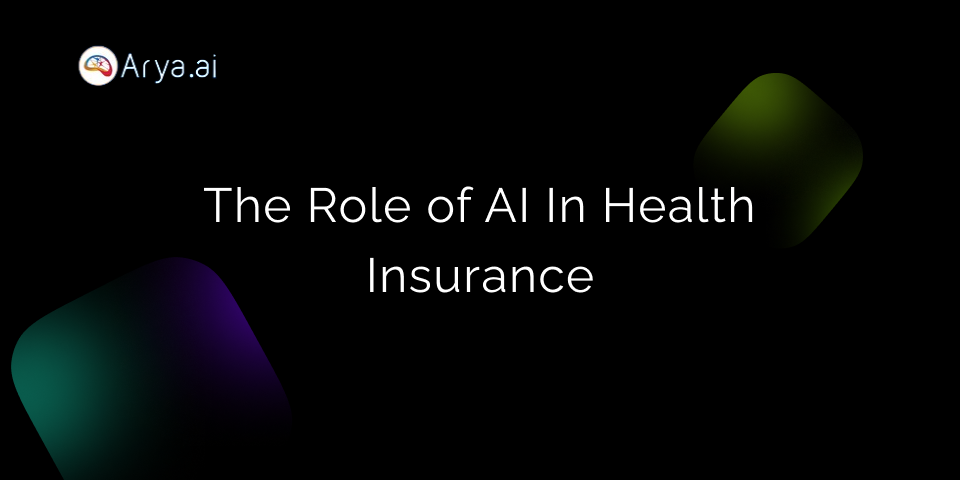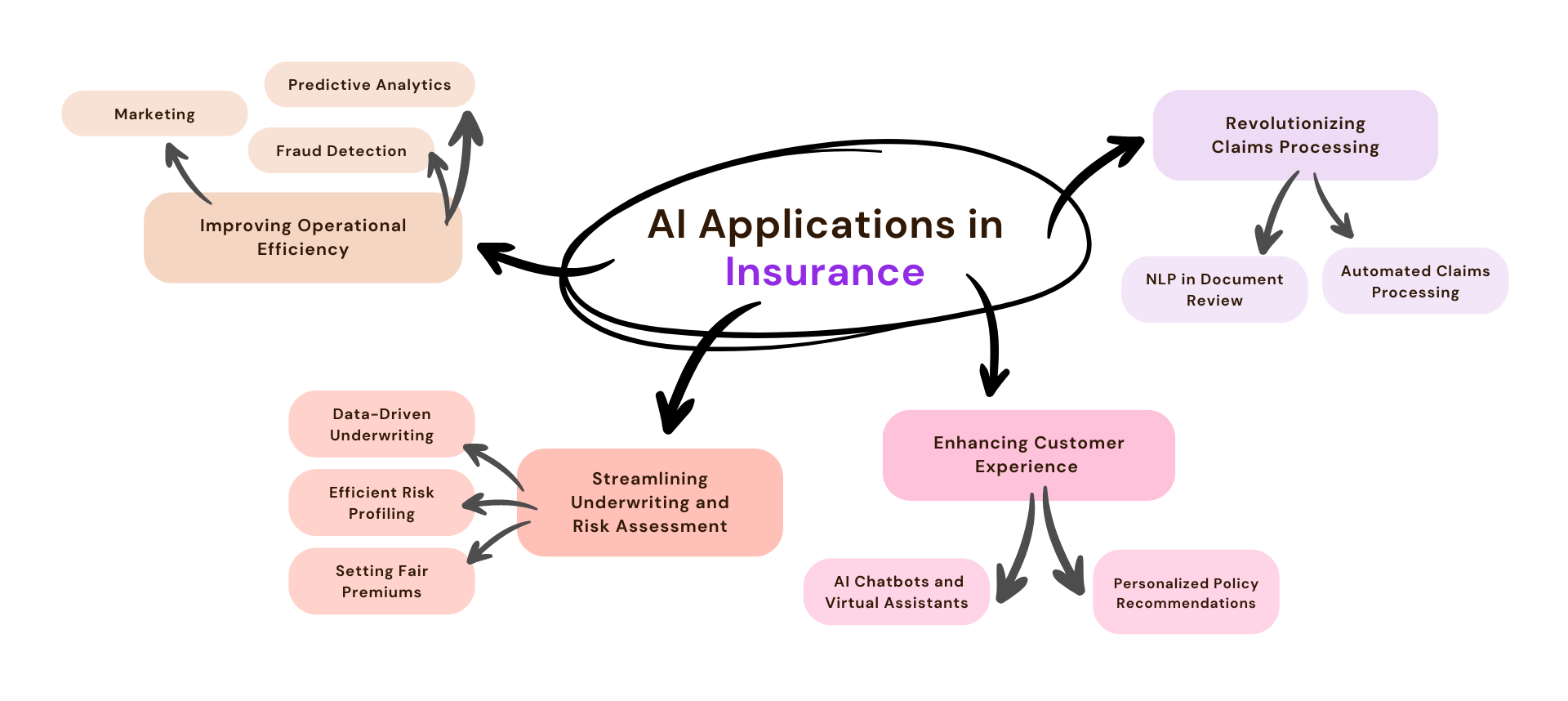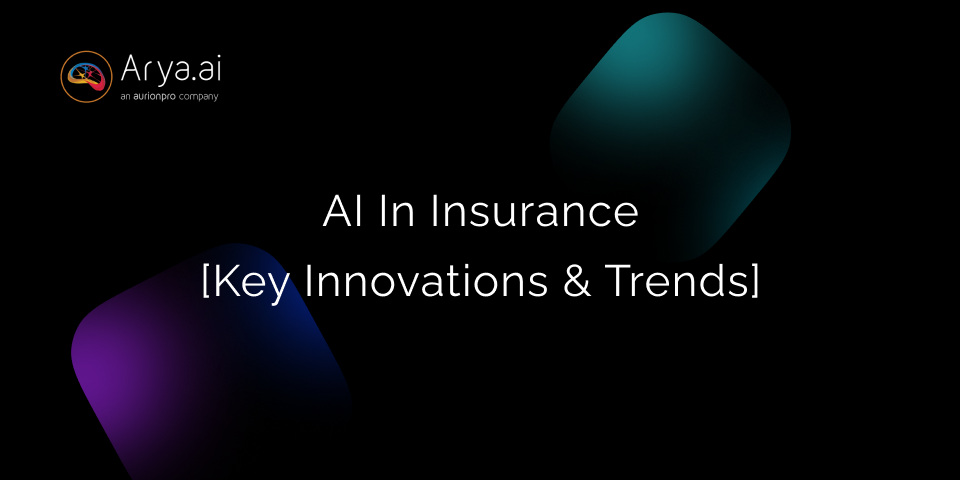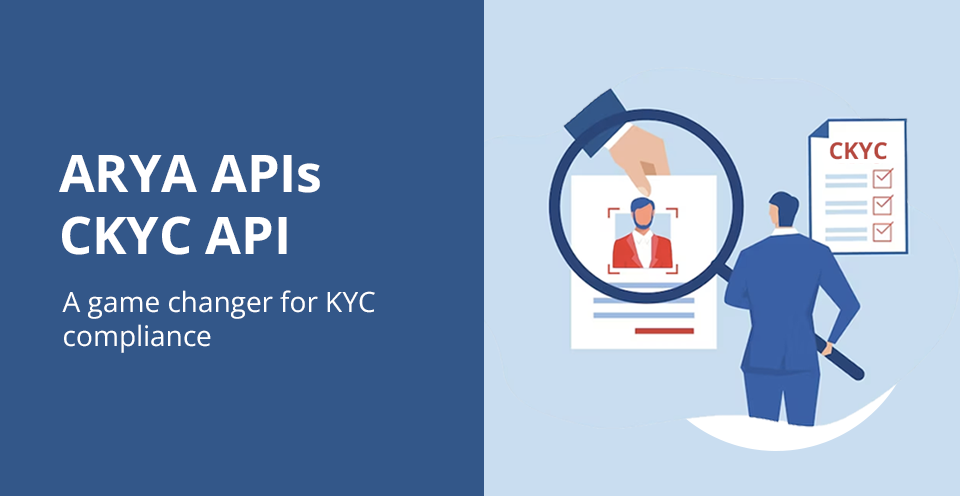All it took was a few years for Artificial Intelligence (AI) to revolutionize countless industries - from healthcare to finance, from marketing to product design; all by introducing automation, improving efficiency and providing deeper insights using data analysis.
Traditionally, the insurance sector relied on manual processes and extensive paperwork, due to large sums of money involved. However, recent advancements in AI, especially in reliability and accuracy, have prompted a significant shift in the insurance sector towards digitization and automation.
A study by Accenture highlights that insurance providers who leverage AI in their operations have seen a 10-15% reduction in loss ratios while getting a 30% increase in customer satisfaction scores. This suggests that AI in the insurance sector benefits both organizations and customers alike.
Given an estimated CAGR of 32.56% for AI adoption in the insurance market from 2022 to 2031, it has become more crucial than ever for insurance providers to stay competitive by improving efficiency, customer experience, and profitability with AI in their workflow. This blog is your complete guide on how AI transforms the insurance industry, exploring key use cases and future trends.
Impact of AI in the Insurance Sector - Key Statistics
- In 2016, only 1.33% of insurance companies invested in AI. Fast forward to 2024 and 90% of them have plans to increase their investments. This dramatic shift shows the growing recognition of AI in a predominantly manual sector like insurance.
- The global AI market in insurance, which was valued at $1.3 billion in 2020, is now projected to reach $6.3 billion by 2026 and a staggering $45.74 billion by 2031.
- The use of AI in customer interactions has surged, with 85% of customer service engagements expected to be handled by AI by 2025.
- CCC Intelligent Solutions, based out of Chicago, published their 2023 AI Adoption Report which revealed a 60% year-over-year increase in the application of AI for claims processing. The company alone has processed more than 14 million unique claims through 2022 using its AI computer vision. This highlights the significant role AI is playing in streamlining claims and improving efficiency.
- A 2024 survey by the Ethical AI in Insurance Consortium found that 80% of insurance companies are either already using AI for business decisions or plan to do so within the year, which is a sharp increase in AI use for claims and underwriting, driven by the need for better operational efficiency and accuracy.
- The Conning Insurance Research report also notes a 77% surge in AI adoption in the insurance industry, chalking up this to the desire for insurance companies to improve customer satisfaction.
These statistics collectively show the impact of AI on the insurance sector, driving substantial growth in efficiency, customer engagement, and overall operational dynamics.

Now, let’s look at AI’s broader role and its practical applications in transforming the insurance industry.
Applications of AI in the Insurance Sector

Enhancing Customer Experience with AI in Insurance
As long as your customers get a better experience, they do not mind insurance companies using AI, despite most people being sceptical or unaware of this technology.
- AI-powered chatbots and Virtual Assistants
AI-powered chatbots and virtual assistants are transforming customer experiences in the insurance sector by providing 24/7, instant, personalized support. These chatbots, with access to vast datasets, handle customer interactions swiftly, from answering basic queries to processing complex requests. They offer immediate assistance for urgent claims, policy information, and support, which would otherwise take much longer with human agents.
Also, AI chatbots use Natural Language Processing (NLP) to guide customers through filing claims, recommend policy upgrades based on individual needs, and give them personalized advice on risk management.
Lemonade Insurance uses AI-powered chatbots
Lemonade, an AI-driven insurance company, incorporated chatbots named Maya and Jim to handle customer interactions. Maya assists customers with signing up for policies and securing insurance by asking simple questions like in a normal conversation and recommending a personalized insurance policy. Jim handles claims processing by tracking a ton of user-generated data points and understanding what the customer needs before they even know it. When combined, Maya and Jim deliver quick policy payouts with zero paperwork.
- Personalized Policy Recommendations
AI in insurance can analyse data sources like customer demographics, purchasing behaviour, social media activity, and telematics from their vehicles to provide them with truly personalized policy recommendations. This helps insurers understand what each policyholder’s risk profile and preferences are, like usage-based auto insurance for young drivers with clean records.
AI can also recommend your customers the most suitable insurance products and adjust them in real-time based on continuous monitoring based on customer behaviour. For instance, if a homeowner installs a new security system, AI can suggest updates to their homeowner's insurance, to reflect the reduced risk, saving them up to 20% on the policy.
Streamlining Underwriting and Risk Assessment
McKinsey predicts that by 2030, underwriting in its current form will cease to exist as the entire process will be reduced to a few seconds. Precise risk assessment, powered by deep learning models and advanced data analytics, helps design better insurance premiums.
- Data-Driven Underwriting
AI-powered systems can analyze medical records, lifestyle data, social media profiles, credit scores and family history for life insurance underwriting. A thorough data analysis, like this, helps insurers optimize underwriting decisions and give customers personalized coverage options.
- Efficient Risk Profiling
Risk profiling becomes faster and more accurate with AI’s inherent power to analyze vast amounts of structured and unstructured data from sources like vehicle telematics, IoT devices, customer interactions, and third-party databases. Predictive analytics help insurance companies find patterns in customers' historical data to manage risks proactively. Also, AI addresses fairness in credit risk assessment by using big data to create uniform loss ratios, making rates proportional to the actual risk posed by each individual.
- Setting Fair Premiums Profitable for both Insurers and Customers
With detailed and precise risk profiles powered by AI, insurers can offer premiums that echo the true level of risk linked with each policyholder. This fairness is beneficial for both insurers and customers:
For Insurers
- Accurate risk assessments help insurers manage their risk exposure better, as it reduces unexpected losses.
- Offering fair premiums based on precise risk profiles helps insurers remain competitive in the market.
For Customers
- Customers who get premiums closely aligned with their actual risk level don’t have to overpay for additional coverage.
- AI-driven underwriting provides more personalized insurance products, tailored to the situations and circumstances of each customer.
Arya AI Automated Underwriting Module (AUM) automates and enhances the evaluation process for insurance applications by leveraging comprehensive data analysis to assess risks and determine pricing.
It includes risk assessment to evaluate potential risks, predictive modeling using historical data to forecast future claims and set premiums, automated decision-making to streamline the approval process, personalized pricing tailored to individual risk profiles, and regulatory compliance to ensure adherence to industry standards.
Allianz uses AI in Underwriting
Allianz strategically implements AI in underwriting, refining processes for quick and accurate offer calculations giving customers a more personal service. This integration of AI has significantly reduced operational costs by 30-50% while driving revenue growth by 15% in some countries.
AI Revolutionizing Claims Processing
Claims processing, which usually takes anywhere from 2 to 6 weeks, can get a big boost in speed with automation, machine learning, and NLP algorithms. Here’s how:
1. Automated Claims Processing:
AI algorithms analyze large volumes of data, including policy documents, claim forms, and supporting documentation. This allows insurers to assess claims quickly and accurately. AI can be used to:
- Analyze the contents of claims
- Extract relevant information from documents (including scans and photographs)
- Assess claims and determine eligible coverage
- Prioritize claims based on urgency
- Identify missing information or documents
- Communicate claim status updates
Insurance companies using AI for claims processing can have a significant reduction in processing time, by up to 70% in some cases. This results in faster claim settlements, which means better customer satisfaction.
How Deep Learning Helps Make Claims Processing Easier
Deep learning enhances claims processing by automating tasks, identifying fraud, and speeding up approvals, making the process smoother and faster for insurers and customers.
Automated Claims Processing (ACP) model streamlines insurance claim handling from submission to settlement, ensuring timely and accurate processing.
With Arya AI Automated Claims Processing, you can-
- Automate claims decisions on complex health claims with high confidence
- Reduce time spent on complex claims through augmented inputs
- Continuously improve automation coverage through feedback learning
Key features include automated claims triage for prioritizing based on severity, fraud detection to identify suspicious claims, AI-driven image and document analysis, real-time processing for swift approvals and payments, and automated customer communication for updates.
This system speeds up processing, boosts customer satisfaction, cuts operational costs, enhances accuracy and consistency in evaluations, and minimizes fraud-related issues.
2. NLP in Document Review and Inconsistency Detection
NLP algorithms can analyze text-based documents, such as insurance claims, policy documents, and medical records, to identify discrepancies, extract relevant information, and flag potential issues for further investigation and prevent document fraud.
Here are some specific roles of NLP:
- Identifying Discrepancies in Claims: NLP helps find inconsistencies in claimant statements, witness testimonies, and medical records. For example, NLP can detect if a claimant provides conflicting information about the date or location of an accident.
- Extracting Key Information: NLP can automatically extract relevant data from unstructured documents, such as names, dates, policy numbers, and medical conditions, for faster claim processing.
- Analyzing Sentiment and Language Patterns: NLP can analyze the sentiment expressed in customer communications, such as emails, social media posts, and claim documents.
- Automating Compliance Checks: NLP can automate reviewing documents for compliance with regulatory requirements.
Streamlining Insurance Renewals With AI
AI can accelerate and streamline insurance renewals by leveraging timely nudges and personalized messages to engage potential customers. By analyzing customer data, AI systems can identify the optimal time to send renewal reminders, ensuring that these prompts are timely and relevant. Personalized messages, crafted based on individual customer profiles and preferences, make communication more engaging and persuasive. This targeted approach reduces the likelihood of missed renewals, enhances customer satisfaction, and improves retention rates. Moreover, AI can predict which customers are at risk of not renewing and proactively address their concerns with tailored offers and solutions, fostering loyalty and ensuring a smoother renewal process for insurers and policyholders.
AI’s Versatility Across Fraud Detection, Analytics, and Marketing
With fraudsters accessing advanced technologies, the insurance sector is betting on AI to prevent insurance fraud in their organizations.

AI-powered fraud detection systems analyze vast datasets to find patterns and anomalies, thus making it easy to flag suspicious activities. Also, with continuous learning, these systems can adapt to evolving fraud tactics, keeping insurance companies ahead of potential threats.
Since the BFSI sector is always evolving with technology and changing customer behaviour, predictive analytics capabilities of AI help insurance companies proactively adjust policies and improve pricing strategies.
The world is at that stage where people understand and skip advertisements that do not resonate with them, so insurance companies need to personalize marketing using AI. By analyzing large datasets, AI can develop detailed customer profiles and segment markets for targeted campaigns. This personalized approach enhances customer loyalty, as AI-powered tools give companies timely and relevant information that is in tune with the latest trends.
All this means that insurance companies get a newfound operational efficiency that wouldn’t have been possible without AI. Also, by automating repetitive tasks like data entry, document verification, and compliance checks, AI significantly reduces costs and minimizes human error.
How Can Arya AI Help Automate Insurance Operations?
As a leading AI company in the BFSI sector, Arya AI offers cutting-edge solutions that significantly enhance and automate various operations in the insurance sector.
1. Smart Onboarding
Intelligent document processing and verification simplify the customer onboarding process. Arya AI ensures end-to-end automation while adhering to security and compliance, enhancing user experience, and reducing processing times.
Products: KYC Extraction, Face Verification, Passive Liveness, Document Fraud Detection
2. Automated Claims Processing
Streamline claims management with Arya AI's automated processing capabilities. By leveraging deep learning and natural language processing, Arya AI Automated Claims Processing can swiftly analyze claims data, detect anomalies, and facilitate faster settlements, minimizing manual intervention and errors.
3. Early Health Assessments
You can proactively detect potential health risks with Arya AI's health vital monitoring app. A quick 30-second facial scan allows Arya AI to analyze key health indicators, offering valuable insights and preventative measures. This proactive approach improves customer wellness and reduces the frequency of claim incidences.
4. Automated Underwriting
Enhance underwriting efficiency with Arya AI's automated underwriting processes. Utilizing deep learning algorithms, Arya AI evaluates applicant data, assesses risk profiles, and generates underwriting decisions with higher accuracy and speed, optimizing risk management and policy issuance.
5. Fraud Mitigation
Arya AI's robust fraud detection and mitigation solutions protect your business from fraud. Arya AI enables proactive fraud prevention by continuously monitoring transactions and identifying suspicious patterns, safeguarding your operations, and enhancing trust.
Future AI Trends in Insurance
Looking ahead, AI is getting all the capabilities to revolutionize the insurance industry, bringing about significant changes and innovations.
Expanding on the future trends in insurance with a focus on Generative AI applications, AI agents, collaborative data ecosystems, and transparent AI:
1. Generative AI Applications:
- Automated Content Creation: Generative AI will create personalized policy documents, marketing materials, and customer communications, ensuring they are tailored to individual customer profiles and preferences.
- Scenario Simulation and Risk Modeling: Generative AI can simulate various risk scenarios (e.g., natural disasters and market fluctuations) to help insurers better understand potential impacts and design more resilient policies.
- Chatbot Enhancements: Using generative AI, chatbots can provide more sophisticated and human-like interactions, improving customer support and engagement.
2. AI Agents:
- Virtual Advisors: AI agents will act as virtual insurance advisors, guiding customers through choosing and managing their insurance policies. These agents will leverage AI to provide personalized recommendations and assistance.
- Automated Negotiation and Settlement: AI agents can handle claim negotiation and settlement with minimal human intervention, making the process faster and more efficient for insurers and policyholders.
- Customer Retention and Acquisition: AI agents will proactively engage with customers to ensure satisfaction and retention, using predictive analytics to identify and address potential issues before they lead to churn.
3. Collaborative Data Ecosystems:
- Data Sharing Platforms: Insurers will collaborate with other industries (e.g., healthcare, automotive, real estate) to create data ecosystems that provide comprehensive risk profiles and insights. This collaboration will lead to more accurate underwriting and innovative product offerings.
- Blockchain for Data Integrity: Blockchain technology will ensure the security and integrity of shared data, enhancing trust and transparency in collaborative ecosystems.
- Real-Time Data Integration: Insurers will leverage IoT devices and real-time data feeds to continuously update risk assessments and policy terms, offering dynamic and adaptive insurance products.
4. Transparent AI:
- Explainable AI Models: Insurers will increasingly adopt explainable AI models to ensure transparency in decision-making processes, making it easier to understand how decisions are made and build trust with customers and regulators.
- Ethical AI Practices: There will be a focus on developing and implementing ethical AI practices to prevent biases and ensure fairness in underwriting, claims processing, and customer interactions.
- Regulatory Compliance: Transparent AI will help insurers comply with regulatory requirements by providing clear documentation and explanations of AI-driven decisions, ensuring accountability and adherence to legal standards.
What to Expect in Insurance by 2030
By 2030, AI will profoundly impact every aspect of the insurance industry, from distribution and underwriting to pricing and claims. Purchasing insurance will become faster and more efficient, with AI creating risk profiles and enabling instant quotes and policy issuance. Blockchain-enabled intelligent contracts will streamline payments and reduce customer acquisition costs. As AI evolves, we'll see a new wave of mass-market instant-issue products and more sophisticated underwriting processes.
Conclusion
The insurance industry is being transformed by AI-driven innovations, changing the very foundation of how companies operate and interact with their customers. From smarter underwriting and faster claims processing to better customer service and proactive risk management, AI helps insurers offer their customers more accurate, personalized, and efficient services.
As AI evolves, it will open up new opportunities in the BFSI sector for innovative products, improved efficiencies, and meeting the demands of digital-first consumers.






